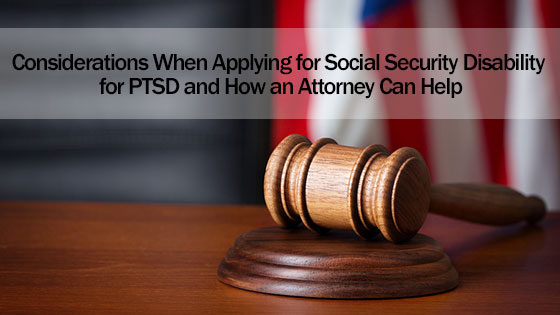Post-traumatic stress disorder (PTSD) is a serious condition that affects individuals who have suffered through a traumatic event such as a natural disaster, violence, serious injury, abuse, rape or other harrowing experience. It can also develop when a person is a witness to such a traumatic situation. It is considered a disability because sufferers will relive the event in their minds and experience recurring flashbacks and nightmares that adversely affect their everyday lives. People with PTSD may be extremely fearful and have regular fits of anger, as well as easily startled. Applying for social security disability for PTSD is a complicated process and many individuals hire a Social Security disability lawyer to help obtain the benefits they deserve.
Diagnosis of PTSD
PTSD is diagnosed by a psychiatrist or psychologist, who determines that a person suffers from the condition based on their personal history and exams of their mental state. Treatment for the condition may include psychotherapy, counseling and even antidepressant or antipsychotic drugs.
PTSD is a mental condition that is considered a disability because of the way it impacts the individual’s daily life. Many people affected by the condition are unable to work because of the frequent, recurring flashbacks they experience. As a result, it is possible to get social security disability for PTSD.
How to Get Social Security Disability with PTSD
In many cases, having a Social Security disability attorney who is experienced in the area of social security disability is a good idea. A lawyer is essential in representing a client in a disability hearing. The individual is required to sign a medical release so that their attorney can obtain all of their medical records relating to their PTSD. The lawyer reviews the records to determine whether the individual may need to undergo more medical tests. Eventually, the records are provided to the Social Security Administration (SSA) prior to a hearing.
In addition, the lawyer may ask a doctor to issue statements on any limitations the individual may have, which can support their case when claiming social security disability benefits. The records, along with these statements, are subsequently given to the judge that presides over the hearing.
How an Attorney Can Help in Preparation for a Hearing
Usually, a Social Security disability lawyer may wait for a month to even as long as two months to speak with a client before a disability hearing. The individual may even speak only with paralegals and administrative assistants prior to that time when calling for advice or to make an inquiry. Often, the attorney can speak with the individual by phone, but if the client is more comfortable meeting in person, that option is possible as well.
To prepare for the hearing to get social security disability benefits for PTSD, the attorney will interview the individual and ask certain questions. The most common of those include the following:
- Can you describe your symptoms?
- Are you currently seeing a doctor for your PTSD?
- Are you anxious or depressed?
- When were you unable to work due to your condition?
- Do you currently work?
- What treatments have you tried?
- What medications do you take? What are their side-effects?
- Do your medications make you feel better?
- Do you have health insurance?
- Are you unable to do things you used to enjoy?
- How do you spend your normal day?
It’s important to note that all answers must be honest, even if they may be embarrassing. It is the only way an attorney can represent their client to the best of their abilities. The attorney is also obligated to not share any information the individual wishes to stay private due to attorney-client privilege.
Call our law offices today at any of our convenient locations and get a free consultation.
Arlington (817) 522-4451
Denton (940) 222-4060
Dallas (972) 362-6848
Fort Worth (817) 764-1375
Cedar Hill (972) 338-9427
McKinney (469) 522-3688
Lewisville (972) 354-4605
You can also contact us online by using our quick contact form.











